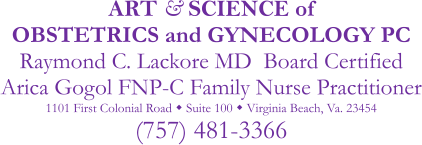Surgery FAQ’S
Knowing the answer to this question is critical
The hope for benefits must outweigh the risks of the procedure.
MOST COMMON REASONS:
Hysterectomy: (Laparoscopic or other)
- To stop Heavy and/or irregular bleeding
- To remove tumors of the Uterus
- To manage / lessen chronic pelvic pain
- To manage / lessen severe menstrual cramps
- To remove pre-cancerous changes of the cervix
- To help correct pelvic relaxation (uterine prolapse).
Laparoscopy:
- To shed light on and manage unexplained pain
- To document, excise, remove endometriosis or scar tissue.
- To remove myomas (fibroids) with minimal invasive approach.
- To perform sterilization
- To tighten ligament supports
- To enhance fertility
Hysteroscopy Dilation and Curettage with Polypectomy (if needed)
- To reduce/shorten bleeding and pain from inevitable miscarriage
- To remove polyps (combined with hysteroscopy)
- To assure high quality sampling of the uterine lining
- To remove smooth muscle tumors
- To reduce heavy bleeding
Ablation of the Endometrium
- To reduce heavy irregular bleeding
- To reduce severe menstrual cramping
Anesthesia Pre-Surgical Instructions
Day of Surgery
• Bathe or shower with soap and water.
• No makeup (cosmetics), aerosol sprays, perfumes, or skin creams.
• Roll-on or stick deodorant is acceptable.
• DO NOT drink alcohol 24 hours prior to your surgery.
• Avoid smoking after midnight.
• You must arrange for someone to bring you home after your surgery. A cab or bus will NOT be acceptable. Please arrange for someone to stay with you for the next 24 hours.
• If you are to be admitted, bring a small bag containing pajamas, robe, slippers, and toiletries.
• A legal guardian must accompany minors. If other than a parent, please bring proof of legal guardianship.
• If any feeling of illness comes up (cold, sore throat, nausea, vomiting, fever, or flu), promptly notify your physician.
• Do not remove your armband, regarding blood work. You must be wearing the armband the day of surgery.
• You need to arrive 2 hours prior to your scheduled surgery time.
Food/Liquids
• Unless otherwise instructed by your physician or anesthesiologist:
Do not eat any solid food after midnight.
You may have clear liquids (water, apple juice, black coffee/tea) up to 5 hours prior to your arrival at the hospital.
Medications
• You may take your Thyroid medication with a sip of water on the morning of your surgery. Consult with your physician if you have any questions regarding other medications.
• Bring the list of medication and dosages with you to the hospital.
Prep
• As directed, please : Per Instructions provided day before surgery by Dr. Lackore
Belongings
• All jewelry (rings, earrings, and body piercings) must be removed prior to going into the operating room. It may be necessary to cut rings if you are unable to remove them.
• If you wear glasses, contact lenses or dentures, they must be removed prior to going to the operating room. Please bring a case for your glasses or contacts.
Items to Bring with You
• Please bring all appropriate Insurance cards and forms with you when you come to the hospital.
This is an alternate number for the Outpatient Surgery Nurses. You would call this number the night before or the morning of your procedure if you have any questions, or if your delayed for some reason the morning of your surgery, such as stuck in traffic, or you have a flat tire etc.. The number is 757-395-8169. The nurses should be calling you in the afternoon or evening prior to your surgery.
Please leave all jewelry and other valuable at home as we will not be responsible for them. Do bring a form of payment (check or credit card) if a copay is indicated. Also, please stop at the front desk, on your immediate left as you enter the Patient Service Center, to register or receive any additional instructions.
IF A HYSTERECTOMY IS SCHEDULED SHOULD YOU HAVE YOUR OVARIES REMOVED AT THE SAME TIME?
Usually, the answer is NO!
REMOVING THE OVARIES ELECTIVELY: Most current evidence suggests that the elective removal of the ovaries at the time of hysterectomy is associated with INCREASED overall mortality (death rate). Ovarian removal is also associated with an increased risk of coronary artery disease, dementia, and osteoporosis!
WHO SHOULD KEEP THEIR OVARIES: Woman under 60 with no increased risk factors for ovarian cancer (mother/sister with ovarian Cancer or BrCa gene). and no known endometriosis with chronic pelvic pain .
ONLY SLIGHT REDUCTION OF OVARIAN CANCER: Research shows the risk of subsequent ovarian cancer (when the ovaries are retained) is very low (0.3% after 24 years in the Nurses’ Health Study). Therefore, for most women removing the ovaries to reduce ovarian cancer risk does not make sense.
WHO SHOULD ELECTIVELY GIVE UP OVARIES: (At the time of a hysterectomy) It seems reasonable to offer prophylactic oophorectomy to women over age 60, those with increased ovarian cancer risk or those with chronic pelvic pain and known endometriosis.
Hospitals are now required to ask about whether you have an Advanced Medical Directive. An Advanced Medical Directive has value for all phases of a mature adult’s life because of the possibility of auto accidents, illnesses or injuries. While It is extremely unlikely it would be needed during your a hospitalization for Gynecologic Surgery, it nonetheless has great general value.
FROM THE VIRGINIA STATE BAR SITE: An agency of the Supreme Court of Virginia.

